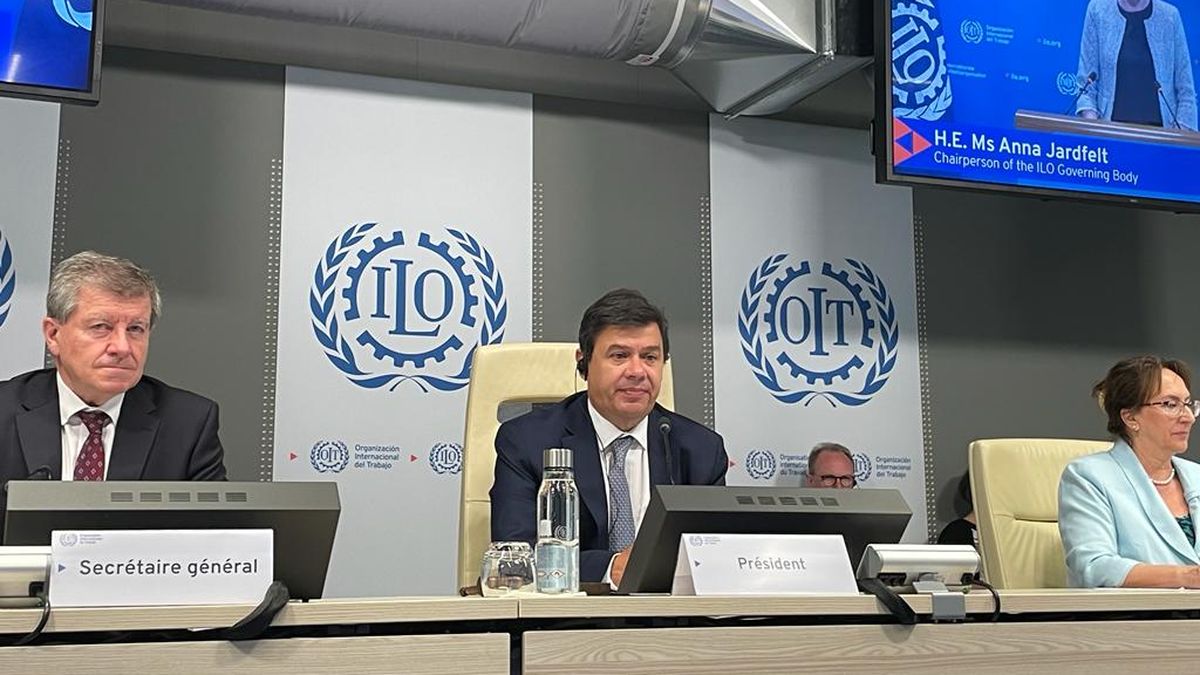Claudius Moroni: The Conference has a constant agenda, which are the issues of application of norms and follow-up of freedom of association. In this case, it aims to incorporate occupational health and safety as a fundamental right. The other constant points are child labor and professional training, because the change in technology and the lack of adequacy between education and the productive system are being considered all over the world. And then the issue that the ILO wants to rescue is the one that from the beginning was thought of as associative forms, what we call popular economy. Because the theme of this economy that moves outside the typical profit-making societies is not an Argentine phenomenon. The ILO had not paid much attention to it, although it raised it from the beginning, so it was placed on an agenda.
Q.: Of those points, which is the one that Argentina has the greatest challenge?
CM: We preside over the two most important commissions, on freedom of association and on the application of standards to control complaints about whether a country complies with ILO standards. But of the others we are interested in the issue of social economy and vocational training. We have a topic on vocational training, not only for young people who need to be trained to enter the job market. Rather, there are activities that are changing and require the workers themselves to acquire new skills.
Q.: In the popular economy, a request that is usually made is that of a universal salary, like the bill that is in Congress. What response could be given to this sector?
CM: The first thing we have to study well are the types of access barriers: how these associative forms are inserted in the production process. Sometimes the problems you have are tax or organizational access barriers. The issue of income substitution can be worked on temporarily or in a targeted manner. But what you need is for people to insert themselves in some way by working. Replacing income is not a solution to the problem.
Q.: The plan to Promote Employment launched by the Ministry of Labor seeks to train 350,000 people to enter the formal labor market with an economic incentive. Is it incompatible with a universal income? What about the other 7 million people who collected the bonus?
CM: I do not want to pose it as punishments or incentives. Those who make the effort to train must have assistance because there are sectors that could not be trained without a scholarship. What the State can do is train it and create conditions to continue with the private sector and some state-owned sectors that carry out productive activities, continuing to hire people. We are not going to generate 7 million jobs in a year, clearly, nobody proposes such a thing. But, the people who received the bonus are not all people who are totally unemployed. We have an informal economy where what we don’t have are registered activities. That is why here the issue of what needs to be worked on is labor and training, but also looking at tax issues, we have issues that complicate the formality that we would have to review.
Q.: What could be an example of this?
CM: There the AFIP has a very good project that is in Congress, which is a productive monotax, so that tax registration in the first years of development of the activity does not become a problem for those who register, that it be a system directly without tax burden, those things work.
Q.: The opposition argues that in order to attack informality, a labor reform is needed, such as lowering taxes or eliminating compensation. What do you think?
C:M.: The diagnosis is wrong, because what we call the unregistered sector is not a uniform phenomenon of dependent employees who work informally in a company. There are also self-employed, small groups. To think that this can be solved by modifying laws is a simple slogan that sounds good, but the solution is more complex. A labor reform is a fantasy to deny rights and not provide any solution.
Q.: The minimum wage that affects social plans for now is maintained with an increase of 45%. When are you going to update it?
CM: Renegotiation is scheduled for August. The idea is always to keep it around what the parity negotiation is, which is what we have been doing, strictly speaking, since we started negotiating we put it slightly higher. Likewise, 32 members vote on the minimum wage and the State does so in case there is no agreement. There the equals weigh more.
Q.: One of the reasons that explained the rise in wages during the Néstor Kirchner government was the increases in the minimum wage by decree or fixed sum. Why are these tools not taken into account?
CM: What happens is that in the first years of the Kirchner government there were no joint negotiations, in the emergency of 2001 they were suspended, so there was no other mechanism and they were signed by decree, after the joint negotiations were opened there were no more. The last decree that there was was the one that we issued at the beginning of the government, in 2019, because you came from the last year of Macri, who spent 8 months of parity without being able to close.
Q: Wouldn’t lump sum raises be more progressive to shore up lower wages?
CM: As long as the joint ventures get salary increases that are adequate to how inflation is coming, I think we have to let them work freely. In an environment of extremely high inflation such as the one we are experiencing, the joint ventures have been solving the issue of salary. There are some more backward and others more advanced. There are also sectors that in the last 2 years of Macri dedicated themselves to sustaining employment because they were on the way to extinction. Now that employment is growing, the salary is recovering.
Q.: At a macroeconomic level, can moving with joint shares with a nominal value of 60% affect the inflationary dynamics?
CM: The reality is that in the last inflationary problems that we had, wages were never the driver. And it doesn’t seem reasonable to me to resolve the issue of inflation by stepping on wages.
Q.: With these levels of inflation, what happens if the parity of 60% is delayed? Is it enough with income policies?
CM: Most of the collective negotiations provided for a review date. As this important inflationary impact happened, we all advanced, the State did it, the policy is not to put ourselves above collective bargaining but to assist in case it falls short. But the problem of inflation must be solved more on the price side, I have no doubts, thinking that you solve it with income policy does not happen.
Q.: On Friday the floor went up to pay the income tax. As with the advancement of minimum wage installments, it was a proposal from Congress. What do you think of this dynamic of requests to the Executive Branch?
CM: What happens is that things are said that have already been announced before, that seem like debates and are not. For example the minimum wage. When we discussed the last parity, one of the commitments that I assumed is that if it happened that inflation was advanced, I would anticipate the installments. It’s the same thing we did last year. In other words, it is not that we made the advance payment because Congress encouraged us, but that it was planned. In Earnings, if you look at all the statements when the law was amended in 2021, both what I and Mercedes Marcó del Pont from AFIP said was that what we wanted to keep was the wage-earning population reached by Earnings at 10% of the total. . We had exceeded 20%, and we said that the Argentine tradition is to work with 10% of high salaries. If you take those statements, what Economy did now is what was already planned.
Q.: Some leaders of the CGT state that the “ideal” is to eliminate Fourth Category Profits because the salary “is not profit.” What do you think?
CM: I do not know countries that do not charge profits to those who are in the 10% of the sectors that earn the most, it does not seem reasonable to me. And about the salary, from a certain rank it can be profit. A director of an important company that earns a couple of million pesos a month has a salary, why are we going to say that it is not profit?
Q.: Perhaps the name of the tax should be changed?
CM: There are countries that call it something else, it’s true. Here it was as Earnings. I would tell you that in international terms, reaching only 10% of wage earners is a very low population.
Source: Ambito
David William is a talented author who has made a name for himself in the world of writing. He is a professional author who writes on a wide range of topics, from general interest to opinion news. David is currently working as a writer at 24 hours worlds where he brings his unique perspective and in-depth research to his articles, making them both informative and engaging.



